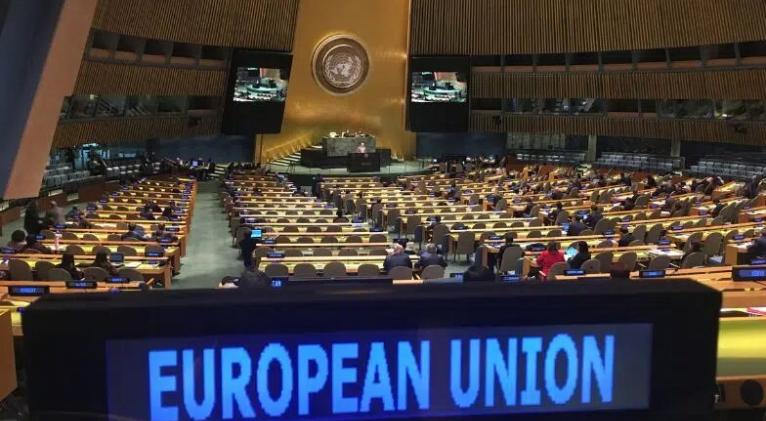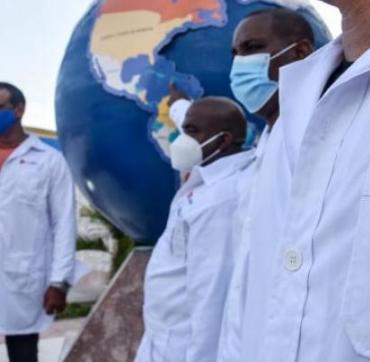Better Together: World Leaders Address the 80th United Nations General Assembly
especiales

World leaders are gathering in New York for the 80th United Nations General Assembly (UNGA), where heads of state and government are addressing the General Assembly during the annual General Debate from 23 to 29 September.
As tradition dictates, Brazil opens the debate, followed by the United States as host country. The speaking order is based on the level of representation, preference and other criteria such as geographic balance. Only the Holy See, the State of Palestine and the European Union are invited to participate in the general debate and their speaking slots are determined by the level of representation. The European Union delivers its statement on 25 September, alongside leaders from across Europe and around the world.
The theme of this year’s debate, “Better together: 80 years and more for peace, development and human rights”, reflects the anniversary of the United Nations, founded in 1945, 80 years ago, and underscores the call for renewed global commitment to multilateralism, solidarity and shared action for people and planet.
Key Events
22 September
-
80th Anniversary of the United Nations: Leaders mark eight decades of the UN and reflect on the path ahead for a more inclusive multilateral system.
-
SDG Moment: The event will bring together a constellation of transformative global and national efforts and will demonstrate how just and inclusive transitions are accelerating progress, even in the face of global challenges.
-
High-Level International Conference for the Peaceful Settlement of the Question of Palestine and the Implementation of the Two-State Solution: Co-chaired by France and Saudi Arabia, the meeting aims to catalyze concrete, timebound and coordinated international action toward the implementation of the two-State solution.
-
30th Anniversary of the Fourth World Conference on Women: Governments and civil society recommit to the Beijing Declaration and Platform for Action as well as reflect on progress since the landmark 1995 conference in Beijing and highlight achievements, best practices, gaps, and ongoing challenges in advancing gender equality worldwide.
23–27 and 29 September
-
General Debate: Heads of State and Government outline national priorities in the General Assembly Hall. Germany’s Annalena Baerbock presides over the session as President of the General Assembly.
24 September
-
Climate Summit: Ahead of COP30 in Brazil. The Secretary-General convenes World Leaders to present their new national climate action plans and seize the benefits of the new clean energy era.
-
Summit for a Sustainable, Inclusive and Resilient Global Economy: The first biennial summit on financing for development reviews progress on sustainable financing and cooperation with international financial institutions.
25 September
-
Noncommunicable Diseases and Mental Health: Leaders meet to set a new vision for the prevention and control of noncommunicable diseases (NCDs) and the promotion of mental health and well-being towards 2030 and beyond.
-
30th Anniversary of the World Programme of Action for Youth: Governments, civil society and youth partners will come together to review progress on the Programme of Action and promote greater youth participation in policymaking.
-
Launch of the Global Dialogue on AI Governance: the high-level informal meeting will launch the Global Dialogue on Artificial Intelligence Governance at the United Nations and will explore key dimensions of inclusive and accountable AI governance.
26 September
-
International Day for the Total Elimination of Nuclear Weapons: Leaders to call for renewed momentum towards nuclear disarmament.
30 September
-
Situation of Rohingya Muslims and Other Minorities in Myanmar: the high-level plenary meeting aims to sustain international attention, review the situation on the ground, and propose a concrete, time-bound plan for a sustainable resolution to the conflict.
A European Perspective
Europe is actively engaged throughout UNGA80 High-Level Week.
-
Germany’s Annalena Baerbock is serving as President of the 80th session of the General Assembly.
-
António Costa, President of the European Council, is delivering the statement on behalf of the European Union at the General Debate on 25 September and is also speaking at the UN Security Council on 24 September.
-
A number of EU Commissioners, including Teresa Ribera, Dubravka Šuica, Wopke Hoekstra, Jozef Síkela, Hadja Lahbib and Magnus Brunner, are participating in discussions on climate, sustainable financing and digital cooperation.
-
France is co-chairing the Conference on Palestine, while EU member states are contributing actively across all thematic debates.
On 23 June, the EU Council adopted conclusions outlining its overarching priorities for the 80th General Assembly:
-
Supporting a multilateral system based on international law and the universality of human rights.
-
Advancing reforms to reinvigorate the UN system, including through the Secretary-General’s UN80 initiative and Security Council reform.
-
Strengthening the UN peace and security architecture, including through the Peacebuilding Architecture Review.
-
Advancing sustainable development in line with the 2030 Agenda.
-
Addressing the triple planetary crisis of climate change, biodiversity loss and pollution.
The EU underlines that, at a time when the global rules-based order is under strain, it remains a predictable, reliable and credible partner, committed to a just green transition, the 2030 Agenda, and a stronger United Nations able to deliver for peace, development and human rights.














Add new comment